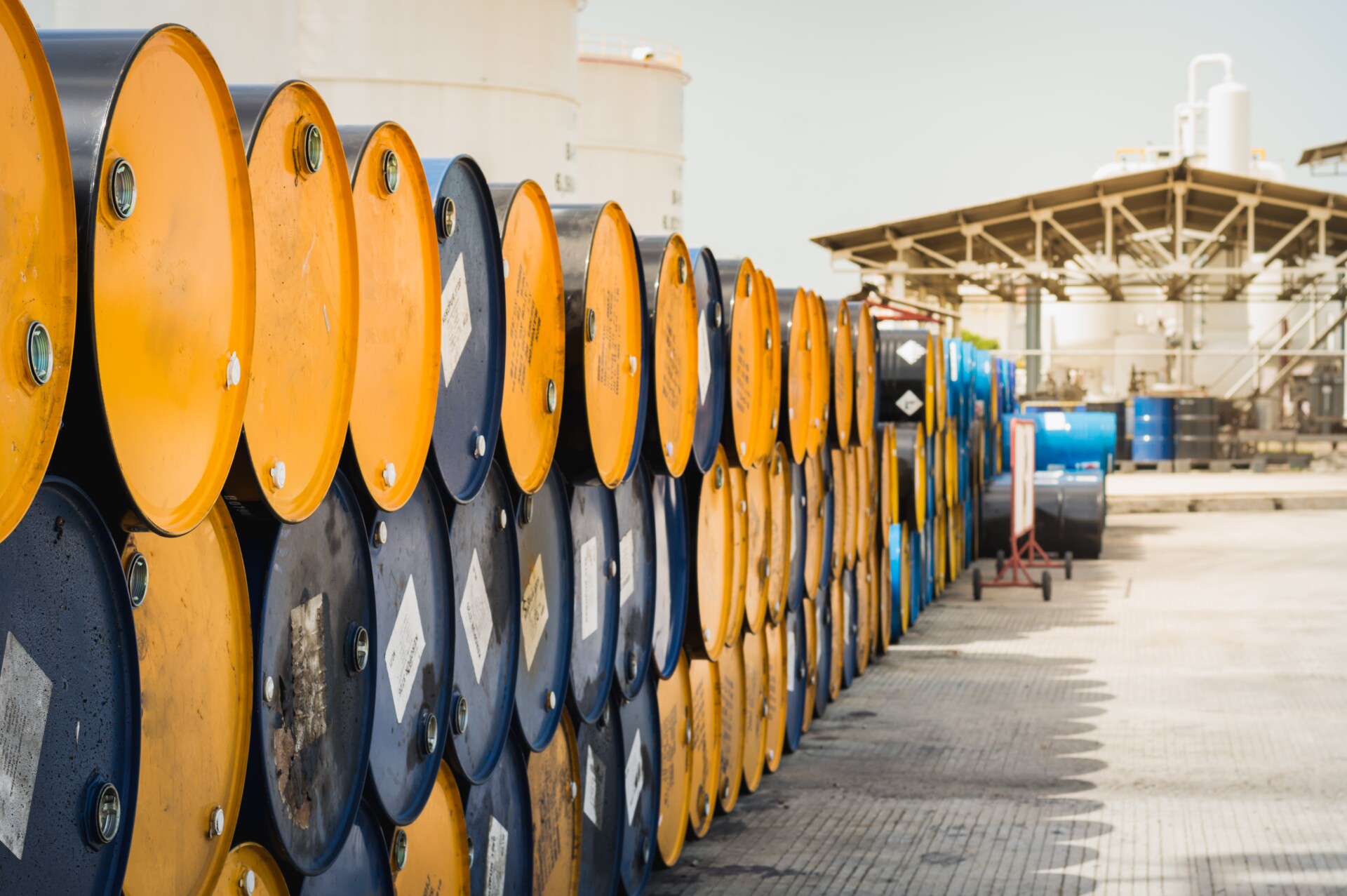Commodity Investments - Definition, Advantages, And Limitations
Commodity investments are like having a stake in the essentials that power industries and our daily lives. But why do people dive into commodity investments? What are the perks, and what should one be cautious about? Let's break it down in straightforward language.
Author:Liam EvansReviewer:Habiba AshtonJan 02, 20248.3K Shares155.1K Views

Commodity investmentsare like having a stake in the essentials that power industries and our daily lives. But why do people dive into commodity investments? What are the perks, and what should one be cautious about? Let's break it down in straightforward language.
What Is Commodity Investing?
Investing in commodities and raw materials essential for various industries offers diverse avenues for potential returns. Oil, a key commodity, significantly influences industries like aviation, where fuel costs impact profitability.
There are multiple approaches to commodity investment. One can opt for physical goods like gold or leveraged exchange-traded funds (ETFs) tied to specific commodity indexes. Additionally, investing in stocks of businesses linked to commodities, such as oil and gas producers or precious metal miners, is another avenue.
Given the inherent volatility of commodities, it is crucial to comprehend the associated risks before investing. Futures contracts represent another strategy, involving agreements to buy or sell commodities at predetermined prices and dates.
While lucrative, such contracts carry substantial risk, necessitating a thorough understanding to navigate potential challenges like margin calls. Investors should be well informed to maximize potential gains and mitigate risks in the dynamic world of commodity trading.
Ways To Invest In Commodities
Investors and traders exploring commodity investment have various avenues, including purchasing physical products, engaging in futures contracts, acquiring shares in production companies, or opting for exchange-traded funds (ETFs).
Futures Contracts
Investing in commodities through futures contracts is a well-known method, albeit a challenging one. Futures trading is characterized by high risk and high reward, making it attractive to seasoned traders.
With relatively low initial investments, leverage can be employed for potentially substantial gains. However, the risk lies in the need to continually add funds if the trade goes against the investor, posing the potential for rapid losses.
Physical Commodities
Direct ownership of physical commodities is another option, although some commodities, like hogs, cattle, and oil, may not be practical for direct ownership. Precious metals, on the other hand, are popular for those seeking tangible assets and a hedge against inflation.
Purchasing bullion, whether through online dealers or pawn shops or acquiring gold and silver coins for their intrinsic value, is a common approach. Care is essential to ensure purchases align closely with the spot price, avoiding overpayment for collector's value on coins.
The primary risk associated with owning precious metals directly is the potential for theft, necessitating robust security measures. Also, the liquidity of these assets can be a concern, especially in urgent selling situations. Achieving the full market value for bullion or coins may be challenging, requiring investors to be flexible based on market conditions.
ETFs For Direct Exposure To Physical Commodities
For investors seeking exposure to physical commodities without the complexities of ownership or futures trading, Exchange-Traded Funds (ETFs) offer a straightforward solution. ETFs provide a convenient and efficient way to take positions in individual commodities or a diversified group of them.
Investors can choose ETFs that track specific commodities such as gold, oil, or a combination of commodities. This approach provides a "pure play" exposure to the commodity market while benefiting from the simplicity and liquidity of an ETF.
The key advantage is the direct exposure to commodity prices and market-based pricing, ensuring optimal returns when liquidating holdings. ETFs also mitigate the risks associated with owning physical commodities, such as the threat of theft and potential storage costs, depending on the nature of the commodity.
ETFs expose investors to the volatility of commodity prices, which can be more pronounced than fluctuations in stock prices. Since commodities themselves don't generate cash flow, the return on investment is contingent on the commodity's performance minus the ETF's costs.
Stocks Of Commodities Producers
Alternatively, investors who prefer not to own physical commodities, perhaps due to their lack of inherent cash flow, can opt for stocks of commodities producers. Investing in such producers allows shareholders to benefit from rising commodity prices in two ways.
An increase in commodity prices typically leads to higher profits for the producing company. The company can boost profits by increasing production over time.
Investing in individual commodity producers carries inherent risks. Industries tied to commodities are prone to boom and bust cycles, and companies often require substantial capital.
Analyzing individual stocks demands thorough research, and investing in a few stocks amplifies the risk compared to a diversified portfolio. Careful understanding of the specific company and industry is essential for investors taking this route.
ETFs Of Commodities Producers
To gain diversified exposure to commodities producers, investors can consider ETFs that hold portfolios of these companies. This approach offers the benefits of diversification, allowing investors to potentially capitalize on the rising prices of specific commodities. For instance, purchasing an ETF focused on gold miners provides exposure to cash-flowing producers while simultaneously betting on the upward trajectory of gold prices.
If the ETF is concentrated on a specific commodity, such as oil producers, diversification is narrow. While investors are protected from overexposure to a single company, a decline in the price of the specific commodity may not be mitigated as effectively as with broad diversification. This trade-off is part of seeking "pure play" exposure to producers of a particular commodity.
Alternative Investments
Commodities, such as precious metals, are often classified as alternative investments, alongside assets like real estate, which deviate from conventional stock and bond trading. In the realm of precious metals, there exists a subset of alternative investments that lean more toward collectibles than traditional investments. Bullion coins and jewelry, adorned with aesthetic and historical value, typically command a premium over the melt price of the metals they contain.
While these items are physical investments capable of appreciating, their pricing is less directly tied to market fluctuations. Purchasing such items can be done through stores, directly from Mints, or from dealers, but they are primarily considered collectibles rather than traditional commodity investments.
Advantages Of Commodity Investing
Investors are drawn to commodity investments for their potential to serve as an effective hedge against inflation, contribute to portfolio diversification, and unlock substantial returns.
Inflation Hedge
Commodities have a historical tendency to rise in value alongside inflation. As key indicators of an inflationary environment, commodity prices often move in concert with inflationary trends. While specific market conditions, such as an abundant harvest, can impact individual commodities, in general, commodities act as a counterbalance to mitigate the dampening effect of inflation on other assets within an investor's portfolio.
Diversification
Beyond their role as an inflation hedge, commodities offer valuable portfolio diversification due to their low correlation with traditional financial assets. Unlike assets influenced by factors like employment figures or central bank policies, commodities are primarily driven by fundamental factors such as supply and demand. This independence makes them a strategic addition to a diversified investment portfolio.
Potential For Large Returns
Commodities, including oil, gold, and cyclically produced soft commodities, present opportunities for significant price movements. Their sensitivity to production forecasts and global events impacting supply chains creates scenarios where investors can capitalize on market dynamics. The allure of substantial returns is a key factor attracting investors to engage in the commodities market.
Limitations Of Commodity Investing
Commodity investing comes with notable drawbacks, including a lack of income, heightened volatility, and exposure to external risks.
Lack Of Income
Unlike investments such as bonds or dividend-paying stocks, commodity investments do not generate regular income in the form of yields. The success of a commodities investment hinges entirely on accurately predicting price movements, as there are no periodic payouts akin to interest or dividends.
High Volatility
Commodities exhibit considerable volatility, with market dynamics subject to abrupt shifts driven by global events. For instance, the invasion of Ukraine by Russia in 2022 caused a rapid surge in wheat prices, significantly impacting the futures and options market. Similar, though less drastic, effects were observed in the oil and gas markets due to Russia's significant role as a supplier. This inherent volatility adds complexity and risk to commodity investments.
External Risks
Commodity investing exposes investors to a multitude of external risks beyond their control. Unforeseen events, such as regional conflicts disrupting supply chains, adverse weather conditions affecting crops, regulatory changes, and political instability, can all impact the flow of goods and create uncertainties.
These external risks are inherent drivers of both volatility and the potential for substantial returns in the commodities market. Investors must navigate these uncertainties and carefully assess the associated risks when engaging in commodity investments.
Requirements For A Commodities Account
Opening a commodities investing account follows a process akin to setting up a standard brokerage account. If you intend to invest in commodities through companies and funds, the procedure aligns with that of a regular brokerage account. These two investment classes typically do not necessitate any special requirements.
However, if your plan involves trading futures and options, it's crucial to verify that your chosen broker offers these options. Also, you may be required to make additional disclosures, demonstrating your comprehension of the associated risks and ensuring you have sufficient capital to withstand potential losses, preventing complete depletion in a single trade.
Requirements For A Brokerage Account
To initiate the opening of a brokerage account, you must furnish personal and financial details and respond to basic inquiries.
The required personal and financial information includes:
- Name, address, and telephone number
- Tax identification number (typically your Social Security number)
- Date of birth and government ID
- Banking information for funding the account
- Level of investment experience and risk tolerance (answering know your client (KYC) questions)
With online brokerages, the initial step typically involves setting up an account with the broker by providing an email and password. Subsequently, additional details are furnished as part of the onboarding process.
Minimum Deposits For A Brokerage Account
While numerous brokerage accounts have zero minimums, engaging in futures trading within a margin account usually mandates holding a minimum of a few thousand dollars with the broker. The actual capital required for trading may exceed the minimum deposit, influenced by factors such as the contracts you intend to trade. Initial and maintenance margin requirements for futures accounts can also be influenced by the account type (individual retirement account vs. non-IRA account).
Requirements For A Gold IRA
Gold Individual Retirement Accounts (Gold IRAs) represent a form of commodity investment tailored for retirement purposes. Distinct from regular IRAs, a gold IRA necessitates finding a custodian to manage the physical assets.
Establishing a gold IRA involves creating a self-directed IRA, selecting a custodian, choosing an approved depository for gold storage, and picking a broker/dealer for gold purchases. Some gold IRA providers integrate these services, while others may refer clients to affiliated service providers.
The required documents and information align with those for general investment accounts and include:
- Name, address, and telephone number
- Tax identification number (typically your Social Security number)
- Date of birth and government ID
- Additional Know Your Customer (KYC) questions
Minimum Deposits A Gold IRA
Gold IRA minimum deposits are relatively high, primarily due to the substantial value of gold. As per IRS rules, only approved gold coins and bars can be used for a gold IRA, with no specified minimum.
While not all gold IRAs specify a minimum, a practical starting amount is often at least $2000. Some gold IRAs may have minimums ranging from $10,000 to $60,000 or more.
Considerations For Opening An Investment Account
Not all brokers provide access to commodities investing. Some digital investment platforms limit offerings to ETFs and stocks. Larger brokers and specialized trading platforms like Schwab, Interactive Brokers, E*TRADE, NinjaTrader, and TradeStation often cater to futures trading.
- Customer support - Brokerage customer support methods vary from phone and email to in-platform chat and social media. Ensure your preferred communication method is available and reliable.
- Fees - While fees for stocks and ETFs have become competitive, futures trading fees are calculated per contract and can range from minimal amounts to several dollars. Balance low fees with the quality of the trading platform.
- Available assets - Commodities trading, especially through futures, is a niche offering. Access to major futures exchanges is essential unless you plan to solely invest through ETFs. Choose a broker that offers the assets you intend to trade.
- Security and reputation -Ensuring the security of your portfolio and trusting your broker's reputation are paramount considerations. It's crucial to verify that the broker implements industry-standard security protocols, including two-factor authentication, and has strategies in place to prevent outages and data breaches.
- Minimum deposit - While low minimum deposits are favorable for encouraging investment, futures trading requires a substantial capital commitment. Investors should be prepared to allocate a significant amount to enable margin accounts and withstand potential market fluctuations. Commodities investing, being inherently risk-oriented, should constitute a prudent portion rather than a majority of your investment portfolio.
- Research tools - Access to robust research tools is essential for understanding and visualizing market dynamics in commodities investing. A comprehensive trading platform can aid in charting quotes, analyzing volume and volatility, and aggregating crucial information such as headlines and calendar events. Although some brokers may charge for additional data feeds, competitive market conditions have generally lowered these costs.
Commodity Investments - FAQ
What Are The Top Three Commodities To Invest?
Three of the most commonly traded commodities include oil, gold, and base metals.
How Do Investors Make Money From Commodities?
Equities of a commodity are easy to trade in, and you can sell your stocks for a profit when the commodity price rises when the commodity produced by the company is in demand.
What Are Examples Of Commodities?
Commodities include agricultural products such as wheat and cattle, energy products such as oil and natural gas, and metals such as gold, silver, and aluminum. There are also “soft” commodities or those that cannot be stored for long periods, which include sugar, cotton, cocoa, and coffee.
Final Thoughts
While commodity investments offer a unique way to diversify and potentially gain from market movements, they're not without their challenges. Understanding the advantages and limitations of these investments is crucial for anyone considering stepping into this dynamic and impactful financial arena. It's about balancing the potential gains with the inherent risks, making informed choices in a world where commodities play a vital role.
Jump to
What Is Commodity Investing?
Ways To Invest In Commodities
Advantages Of Commodity Investing
Limitations Of Commodity Investing
Requirements For A Commodities Account
Requirements For A Brokerage Account
Requirements For A Gold IRA
Considerations For Opening An Investment Account
Commodity Investments - FAQ
Final Thoughts

Liam Evans
Author

Habiba Ashton
Reviewer
Latest Articles
Popular Articles

